Bernese Mountain Dog
- February 5, 2024
- 0 comment
The Bernese Mountain Dog, often affectionately known as the Berner, is a remarkable breed that exudes both elegance and warmth. Originating from the picturesque Swiss Alps, these gentle giants have earned a special place in the hearts of dog enthusiasts worldwide. With their striking tri-colored coat, sturdy build, and sweet disposition, Bernese Mountain Dogs are a breed like no other. They boast a rich history as hardworking farm dogs, having served as loyal companions to Swiss farmers and herders for generations.
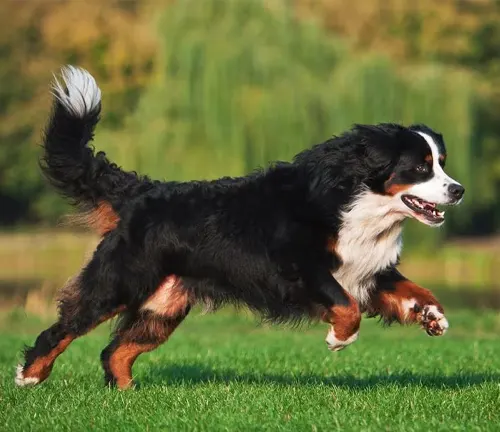
Today, they continue to captivate families and individuals alike with their unwavering loyalty, friendly demeanor, and affectionate nature. Whether it’s their striking appearance or their loving personality, Bernese Mountain Dogs stand as a testament to the timeless bond between humans and their four-legged companions.
| Attribute | Specification |
|---|---|
| Origin | Switzerland |
| Size | Large |
| Weight (Male) | 80-115 pounds (36-52 kg) |
| Weight (Female) | Slightly smaller than males |
| Height (Male) | 25-27.5 inches (63.5-70 cm) at shoulder |
| Height (Female) | Slightly smaller than males |
| Coat | Long, silky, tri-colored |
| Coat Colors | Black base with rust and white markings |
| Temperament | Gentle, affectionate, loyal |
| Lifespan | 6-8 years (with proper care) |
| Exercise Needs | Moderate, daily walks and playtime |
| Grooming Requirements | Regular brushing, occasional baths |
| Health Concerns | Hip and elbow dysplasia, bloat, cancer |
| Compatibility | Good with children and other pets |
| Trainability | Intelligent but can be stubborn |
A Gentle Giant Amongst Canines
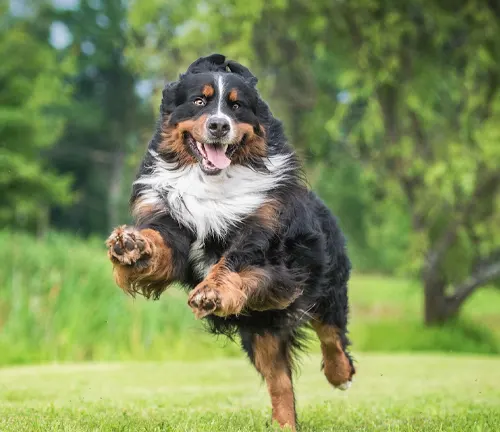
The Bernese Mountain Dog, often simply referred to as the Berner, is a majestic and affectionate breed that has captured the hearts of dog enthusiasts worldwide. Known for their striking appearance and gentle temperament, Bernese Mountain Dogs are a popular choice for families and individuals alike. In this comprehensive article, we will delve into the fascinating world of Bernese Mountain Dogs, exploring their history, characteristics, care, and much more.
Origin and History
The Bernese Mountain Dog’s roots trace back to Switzerland, specifically the Bernese Oberland region. They were originally bred as working dogs by Swiss farmers and herders. Their primary roles included pulling carts, herding livestock, and guarding farms. Their history dates back over a century, making them a beloved and time-tested breed.
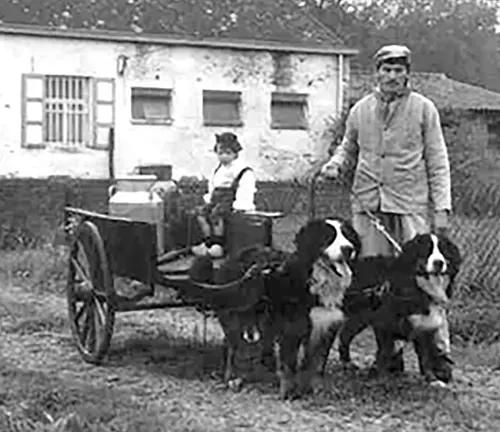
Physical Characteristics
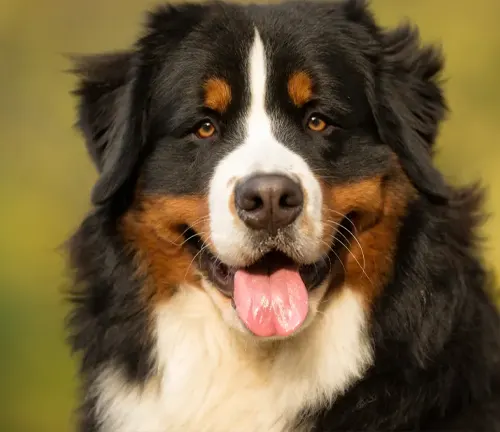

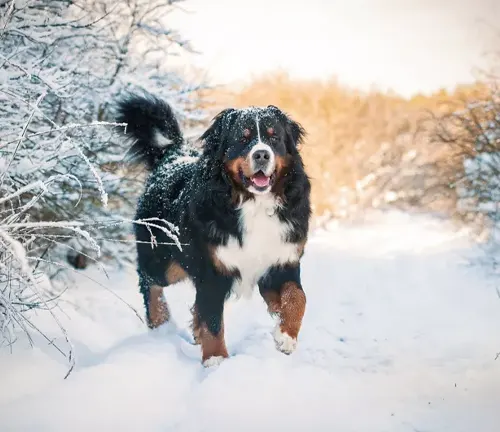
- Size: Bernese Mountain Dogs are considered a large breed, with males typically standing between 25 to 27.5 inches (63.5-70 cm) at the shoulder, and females slightly smaller.
- Build: They have a sturdy and well-proportioned build, reflecting their history as working dogs. Their bodies are strong and muscular.
- Coat: Bernese Mountain Dogs have a long, silky coat that is one of their most distinctive features. Their coat is tri-colored, with a black base, rust-colored markings on the face, legs, and chest, and white on the paws, tail tip, and a prominent white blaze on the chest.
- Head: They have a broad and expressive head with a pronounced stop and a black nose. Their eyes are dark brown and almond-shaped, giving them an intelligent and gentle expression.
- Ears: Berners have medium-sized, triangular ears that hang close to their head. The edges of their ears are typically black.
- Tail: Their tail is bushy and reaches down to their hocks. It is carried low when at rest but may be raised slightly when alert.
- Feet: They have strong, well-arched feet with black pads. Their toes are compact and well-knuckled.
- Overall Appearance: Bernese Mountain Dogs are known for their balanced and harmonious appearance. Their tri-colored coat, white markings, and expressive eyes contribute to their striking and majestic look.
Temperament and Personality
Bernese Mountain Dogs are renowned for their gentle and affectionate nature. They are known to be excellent family dogs, often bonding closely with their human companions. Their friendly disposition makes them great with children and other pets, and their loyalty is unwavering.

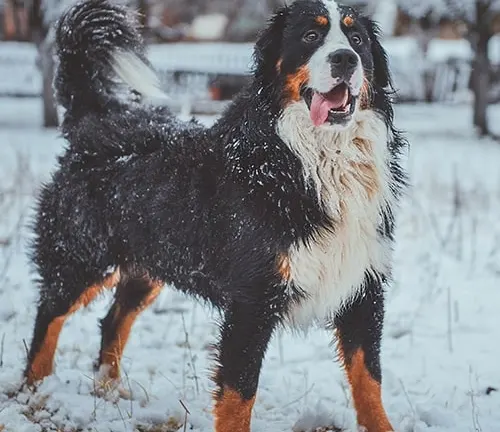
- Gentle Nature
Bernese Mountain Dogs are renowned for their gentle and loving disposition. They have a calm and easygoing temperament, which makes them wonderful family pets. - Affectionate
Berners are incredibly affectionate dogs. They form strong bonds with their human family members and enjoy being close to them. They often seek out affection and are known for their warm and loving cuddles. - Loyal and Protective
These dogs are deeply loyal to their owners. While they are friendly and sociable, they can also be protective when needed. They may bark to alert you to potential intruders, making them good watchdogs. - Good with Children
Bernese Mountain Dogs are typically excellent with children. They have a patient and tolerant nature, making them great playmates for kids. Their gentle disposition ensures that they are usually very gentle with young family members. - Social
They tend to get along well with other pets, including cats and smaller dogs, especially if they are socialized from a young age. Their friendly nature extends to other animals. - Easygoing
Berners have a laid-back and easygoing attitude, which makes them adaptable to various living situations. They are content both in rural and urban settings, as long as they receive the love and attention they crave. - Intelligent
While they may not always exhibit a strong desire to please, Bernese Mountain Dogs are intelligent dogs. With consistent and positive reinforcement-based training, they can learn commands and basic obedience. - Affable Demeanor
They have an affable demeanor that endears them to strangers and friends alike. They are often described as “gentle giants” due to their large size and gentle nature. - Emotional Sensitivity
Bernese Mountain Dogs can be emotionally sensitive, picking up on the moods and feelings of their human companions. This sensitivity adds to their ability to provide comfort and companionship. - Playful
Despite their size, Berners enjoy playtime and may even exhibit a playful puppy-like behavior well into adulthood. They are always up for a game of fetch or a leisurely walk.
Care and Maintenance
Exercise Needs
Despite their size, Bernese Mountain Dogs are not overly active dogs. They enjoy moderate exercise, such as daily walks and playtime in a secure yard. They are sensitive to hot weather, so it’s crucial to exercise them in cooler temperatures to prevent overheating.
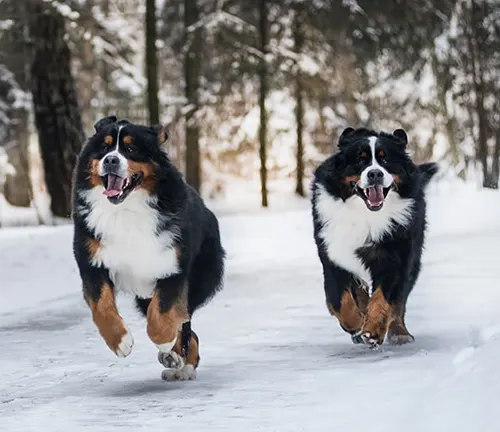
Grooming
Their beautiful, long coat requires regular grooming to prevent matting. Weekly brushing and occasional baths are essential to keep their fur in tip-top condition. Additionally, routine nail trimming and dental care should not be overlooked.
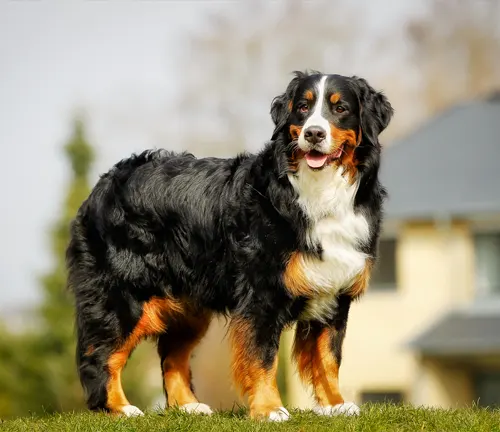
Common Health Issues
Like all breeds, Bernese Mountain Dogs are prone to certain health issues. These can include hip and elbow dysplasia, bloat, and certain cancers. Regular veterinary check-ups and a well-balanced diet can help mitigate some of these concerns.


- Hip Dysplasia: This is a genetic condition where the hip joint doesn’t develop properly, leading to arthritis and pain. Bernese Mountain Dogs are prone to hip dysplasia due to their size and structure. Regular veterinary check-ups and weight management can help mitigate this issue.
- Elbow Dysplasia: Like hip dysplasia, elbow dysplasia is a developmental condition that affects the elbow joint. It can cause lameness and discomfort. Berners can be susceptible to this condition, so monitoring their mobility and seeking veterinary care when needed is crucial.
- Bloat (Gastric Torsion): Bernese Mountain Dogs have deep chests, which can make them susceptible to bloat, a life-threatening condition where the stomach twists and traps gas and food. Immediate veterinary attention is required if bloat is suspected.
Different Species
The Bernese Mountain Dog, also known as the Berner Sennenhund, is a specific breed of dog rather than a group of different species. Therefore, there are no different species of Bernese Mountain Dogs.
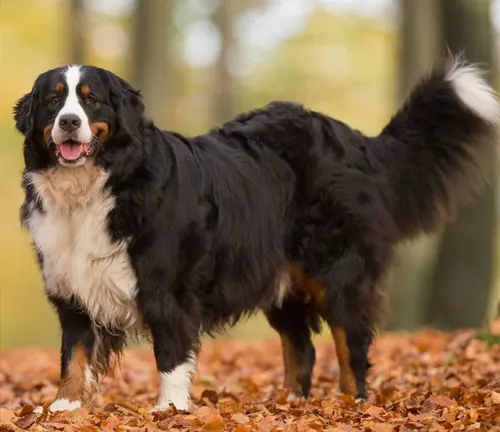
Frequently Asked Questions (FAQs)
- Are Bernese Mountain Dogs good with children?
Bernese Mountain Dogs are known for their gentle and affectionate nature, making them great family pets. They often get along well with children and can be protective of them. - Do Bernese Mountain Dogs require a lot of exercise?
While they enjoy moderate exercise, Bernese Mountain Dogs are not overly active. Daily walks and playtime in a secure yard are typically sufficient to keep them happy and healthy. - What should I feed my Bernese Mountain Dog?
It’s recommended to feed your Bernese Mountain Dog a high-quality dog food formulated for large breeds. Consult your veterinarian for specific dietary guidance based on your dog’s age and activity level. - Do Bernese Mountain Dogs shed a lot?
Yes, they do shed, especially during seasonal changes. Regular grooming, including weekly brushing, can help manage shedding and keep their long coat in good condition. - How long do Bernese Mountain Dogs typically live?
The average lifespan of a Bernese Mountain Dog is around 6 to 8 years. However, with proper care, some individuals may live longer. Regular veterinary check-ups and a healthy lifestyle can contribute to their longevity. - Are Bernese Mountain Dogs good guard dogs?
While they are friendly and gentle, Bernese Mountain Dogs are also known to be protective of their family. They may bark to alert you to potential intruders but are not typically aggressive. - Do Bernese Mountain Dogs get along with other pets?
Berners generally get along well with other pets, including cats and smaller dogs, especially if they are socialized from a young age. - Do Bernese Mountain Dogs have specific health concerns?
Yes, they can be prone to certain health issues, including hip and elbow dysplasia, bloat, and certain cancers. Regular veterinary check-ups are crucial for early detection and prevention. - Are Bernese Mountain Dogs easy to train?
They are intelligent dogs but can be a bit stubborn at times. Consistent and positive reinforcement-based training methods tend to work best with Berners. - Do Bernese Mountain Dogs need a lot of grooming?
Yes, their long and beautiful coat requires regular grooming. Weekly brushing, occasional baths, and routine nail trimming are essential to keep their fur in good condition. - Can Bernese Mountain Dogs handle hot weather?
They are sensitive to hot temperatures and can overheat easily. It’s important to provide shade, fresh water, and limit outdoor activities during hot weather. - Are Bernese Mountain Dogs good for apartment living?
Due to their size and exercise needs, they are more suited to homes with a yard. However, if you can provide them with enough exercise and space indoors, they can adapt to apartment living. - Do Bernese Mountain Dogs drool a lot?
Some Berners may drool more than others, especially after eating or drinking. It’s a characteristic of the breed, and keeping a towel handy can help manage drool. - Are Bernese Mountain Dogs prone to separation anxiety?
They are known for forming strong bonds with their owners, and some individuals may experience separation anxiety. Proper training and gradual desensitization can help alleviate this issue.







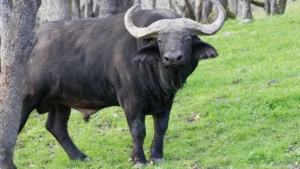



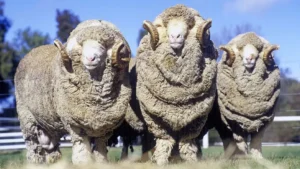


Leave your comment